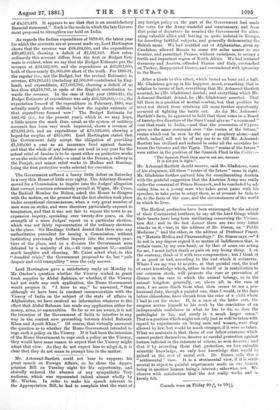As regards the Indian expenditure of 1879-80, the latest year
for which the accounts are at present made up, Lord Hartington shows that the revenue was 268,484,666, and the expenditure £69,667,615, showing a deficit of £1,182,949. How extra- ordinarily this account differs from the first or Bridget Esti- mate is evident, when we say that the Budget Estimate put the revenue at £64,562,000, and the expenditure at £65,917,000, both of them nearly £4,000,000 short of the truth. For 1880-81, the regular (i.e., not the Budget, but the revised Estimate) is, revenue, 270,783,615 (including £2,000,000 contributed by Eng- land), and expenditure, £77,003,382, showing a deficit of no less than £6,219,767, in spite of the English contribution to- wards the revenue. In the case of that year (1880-81), the Budget Estimate of expenditure was only £66,329,000,—i.e., the expectation formed of the expenditure in February, 1880, was actually nearly eleven millions below the regular estimate of that expenditure formed now ! The Budget Estimate for 1881-82 (i.e., for the present year), which is, we may hope, a little nearer the mark than usual, as the system of military accounts has been very much improved, shows a revenue of £70,981,000, and an expenditure of £70,126,000, showing a hoped-for surplus of £855,000. Lord Hartington stated that the Government fully accept the obligation of providing £1,500,000 a year as an insurance fund against famine, and that the whole of any balance not used in any year for the actual relief of famine is to be spent either on protective works or on the reduction of debt,—a canal in the Deccan, a railway in the Punjab, and minor relief works in Madras and Bombay, being the first protective works selected for execution.






























 Previous page
Previous page